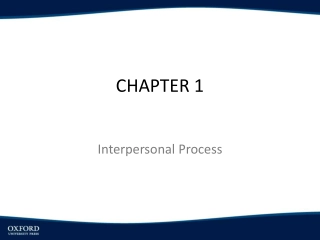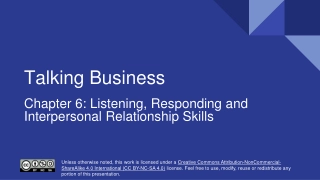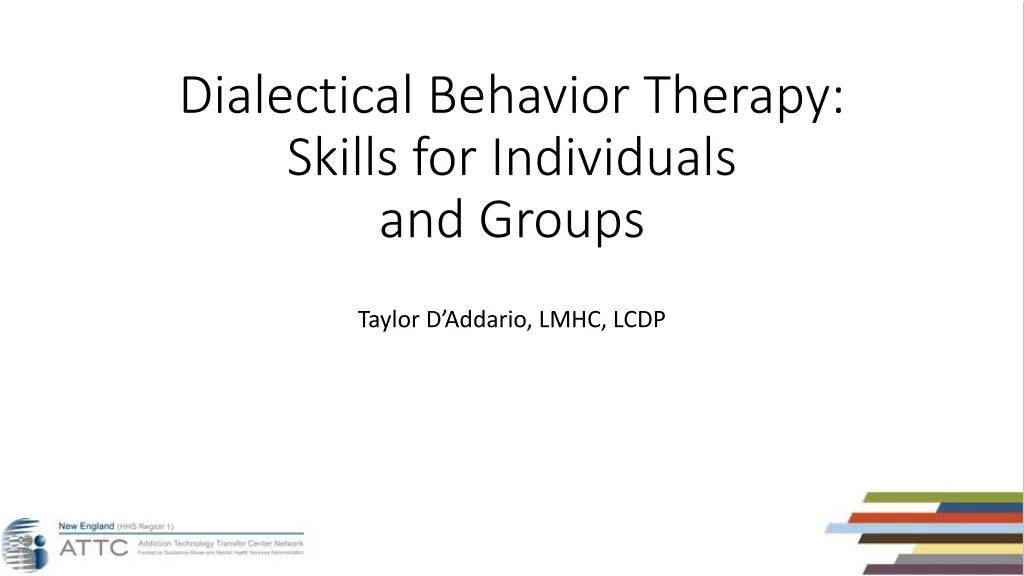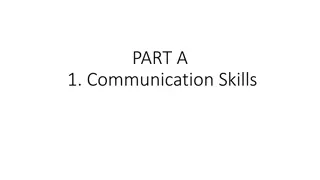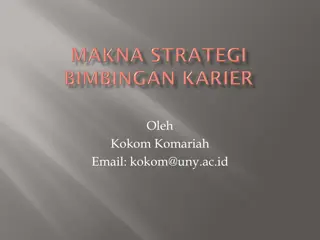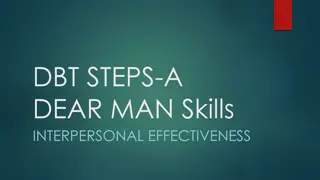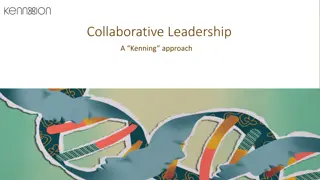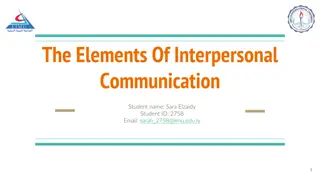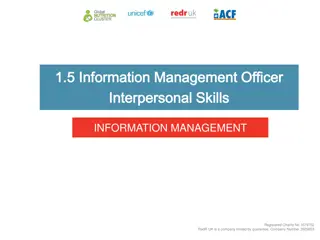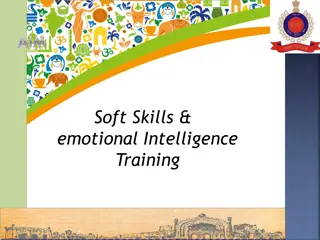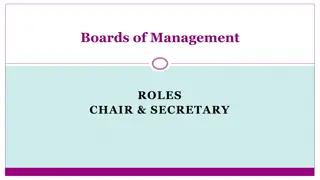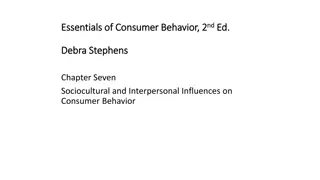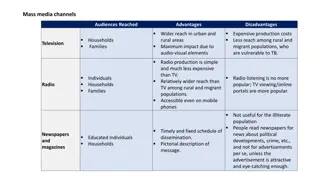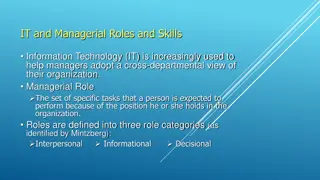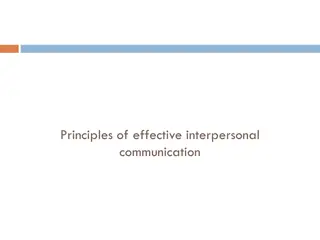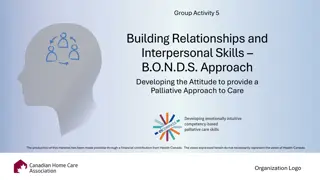Interpersonal Process
Explore the significance of interpersonal communication in addressing physical, social, and practical needs, the impact of technology and cultural diversity, and the importance of communication competence.
0 views • 27 slides
Enhancing Interpersonal Communication Skills
Explore the dynamics of interpersonal communication in this chapter, covering topics such as social penetration theory, self-disclosure principles, intrapersonal communication, and self-concept understanding. Learn how to improve communication effectiveness and relationships through active listening
0 views • 13 slides
Understanding Dialectical Behavior Therapy (DBT) Skills and Practices
Explore the foundations of Dialectical Behavior Therapy (DBT) as a treatment for various dysregulation behaviors. Learn about the history, skills, and outcomes associated with DBT, including mindfulness practices and emotional regulation techniques. Discover how DBT combines cognitive behavioral the
5 views • 96 slides
Interpersonal factors and their impact on pain transitions
Exploring the impact of interpersonal factors on pain transitions, this research delves into the communication and behaviors between individuals experiencing pain, such as parent-child relationships and interactions with healthcare providers. The study analyzes psychosocial mechanisms influencing pa
3 views • 24 slides
Developing Effective People Skills in Collaborative Work Environments
In Eng101 New Language Leader Level 1, students explore the significance of peer collaboration and group work, learn about different types of TV programs, and practice writing reviews. The lesson emphasizes the value of working with others, highlighting skills such as effective communication, listen
1 views • 18 slides
Embracing Cultural Intelligence: Moving Beyond Stereotypes
Explore the complexities of culture, interpersonal dynamics, and cultural intelligence through the lens of individuals like Paul N.Wolfskill. Discover how culture influences behaviors and perceptions, and how developing cultural intelligence can bridge gaps and foster understanding.
1 views • 16 slides
Effective Strategies for Managing Interpersonal Conflict at Work
In this seminar led by experts in organizational psychology, attendees learn practical approaches to reduce interpersonal conflict fallout in the workplace. Discussions range from understanding individual and organizational factors influencing conflict to exploring remedies for resolving conflict es
1 views • 21 slides
Understanding Professionalism in the Workplace
Professionalism in the workplace involves conforming to specific rules governing appropriate behavior at work. This includes adherence to job-specific policies, environmental rules for creating a positive work environment, and personal conduct guidelines. Possessing qualities like interpersonal skil
1 views • 26 slides
Effective Communication: Understanding Styles and Advantages
Communication encompasses various styles including verbal, non-verbal, visual, and written forms. Each style plays a crucial role in conveying information efficiently. Written communication offers advantages like creating a permanent record, meticulous presentation, easy circulation, and suitability
10 views • 21 slides
Understanding Career Guidance Strategies
Career guidance strategies involve assessing individual potential, values, environmental influences, and decision-making skills. Counseling techniques, interpersonal relationships, and instructional methods play key roles in guiding individuals towards their career paths. By recognizing one's streng
10 views • 17 slides
Understanding Theme and Function in Language
Explore the concepts of theme and function in language including topical, interpersonal, and textual themes. Learn how themes come first in a clause and can be assigned transitivity functions, moods, and more. See examples and visual representations to enhance your understanding.
5 views • 13 slides
Effective Communication Using DEAR MAN Skills in Interpersonal Relationships
DEAR MAN is a mnemonic device that helps in utilizing assertiveness and interpersonal skills in personal situations. It involves steps like Describe, Express, Assert, Reinforce, BE Mindful, Appear Confident, and Negotiate. By following these steps, individuals can effectively communicate their needs
7 views • 11 slides
Examining Loyalty in Translation: Perspectives and Implications
Exploring the concept of loyalty in translation studies through the lens of Christiane Nord's work, this content delves into the evolving definition of loyalty in the context of interpersonal relationships and social responsibility among translators. It compares fidelity with loyalty, discusses the
4 views • 16 slides
Collaborative Leadership
Join the Collaborative Leadership program designed to enhance personal impact and foster collaborative work environments through a series of workshops, group sessions, and coaching. Learn the Kenning approach for problem-solving and engagement in Interpersonal Effectiveness, Engaging Complex Problem
0 views • 28 slides
Mastering Interpersonal Communication Skills for Success in the Workplace
Interpersonal communication involves the exchange of information, ideas, and feelings through verbal and non-verbal methods. Developing strong skills in encoding, decoding, feedback, and utilizing different communication mediums is crucial for effective communication. Good interpersonal skills enhan
0 views • 9 slides
Effective People Management Skills and Delegation in Business Administration
Successful people managers exhibit qualities such as autonomy, feedback, interpersonal skills, ethics, and effective delegation. Delegation involves giving scope, responsibility, and authority, supported by training and development, to increase efficiencies and flexibility in the workplace.
0 views • 12 slides
Understanding Interpersonal and Intrapersonal Conflicts in Business Administration
Exploring the differences between interpersonal and intrapersonal conflicts, this presentation delves into the meaning of conflicts, their occurrence, key topics, and resolution strategies. It highlights conflict scenarios in various settings and emphasizes the importance of effective communication
2 views • 11 slides
Competencies for Electrical Mobility at Polis University, Tirana, Albania
This catalogue outlines the competencies required for electrical mobility, focusing on three key areas: Intrapersonal competence, Engineering competence, and Interpersonal competence. It emphasizes adaptability, self-management, resilience, and lifelong learning as essential qualities for success in
0 views • 19 slides
Exploring the Impact of Social Media on Communication
Delve into the influence of social media on communication styles, analyzing popular terms like "selfie, YOLO, like, bae, hashtag." Understand the evolution of language through social media platforms, discussing its pros and cons on interpersonal interactions. Explore the challenges in deciphering so
1 views • 6 slides
Developmental Trauma
Exploring the effects of developmental trauma on children whose parents are involved in care proceedings, this content delves into the cognitive and emotional responses of children, the impact on interpersonal interactions within court settings, and the responses elicited from professionals working
0 views • 27 slides
Empowering Women: Assertiveness Training and Overcoming Barriers
This content discusses assertiveness training for women, focusing on communication skills, handling interpersonal disputes, understanding assertive behavior, and overcoming barriers to assertiveness. It emphasizes the importance of women asking for help when needed, challenging societal expectations
0 views • 18 slides
Improving Interpersonal Skills for Effective Information Management
Enhancing interpersonal skills is crucial for Information Management Officers (IMOs) to work effectively with diverse stakeholders. This includes understanding various perspectives, tailoring communication, listening actively, and leading stakeholders. Challenges like inter-personal issues can imped
0 views • 29 slides
Unveiling the Power of Soft Skills in Professional Success
Soft skills play a crucial role in enabling individuals to interact effectively and achieve their goals. The types of soft skills, including communication, leadership, influencing, interpersonal, and personal skills, highlight the diverse abilities needed to navigate today's dynamic work environment
0 views • 12 slides
Soft Skills in the 21st Century: A Key Focus for Accountants
Soft skills are essential for accountants in the 21st century to excel professionally. Prof. Onafowokan O. Oluyombo highlights the importance of communication, interpersonal skills, flexibility, time responsiveness, teamwork, work ethics, and a positive attitude. These skills enhance employability,
0 views • 19 slides
Therapeutic Factors in Group Therapy: Enhancing Interpersonal Relationships
Explore the therapeutic factors in group therapy that focus on enhancing interpersonal relationships, instilling hope, promoting universality, and fostering group cohesiveness. Through interactions with fellow group members, clients can improve their interpersonal skills and generalize lessons learn
0 views • 29 slides
Food and Beverage Service: Table Setting and Appointment Essentials
Creating an inviting dining experience involves understanding table appointments, setting a table correctly, and enhancing overall service quality. This unit covers table setting details, types of drinks served, communication importance, interpersonal skills, food and drink service techniques, and m
0 views • 26 slides
Enhancing Compassion in Education and Healthcare
Explore the concept of compassion in education and healthcare, focusing on understanding others' emotions, developing a compassionate approach, and promoting mental well-being. Learn techniques and activities to cultivate compassion, including grounding exercises and the FOFBOC method. Encourage sel
0 views • 30 slides
Understanding Kohlberg's Stages of Moral Development
Kohlberg's stages of moral development, built upon Piaget's psychological theory, outline six developmental stages of moral reasoning, with each stage offering a higher level of response to moral dilemmas. Kohlberg focused on justice in moral development and emphasized the importance of how individu
0 views • 19 slides
Comprehensive Soft Skills & Emotional Intelligence Training for Police Officers
This training module aims to equip police officers with soft skills and emotional intelligence, essential for effective communication, conflict resolution, and professional development in policing. It covers understanding concepts, importance of attitude, behavior impact on communication, conflict d
1 views • 26 slides
Roles and Responsibilities of School Boards of Management
School Boards of Management play a crucial role in overseeing the effective governance and management of schools. Their responsibilities include ensuring a safe learning environment, upholding the school's values, setting policies, and planning for the future. Effective communication, clarity of rol
0 views • 25 slides
Enhancing School Success Through Social and Emotional Learning (SEL)
Understanding the crucial role of Social and Emotional Learning (SEL) in promoting children's ethical development is key to improving academic achievement, fostering positive school climate, and reducing behavioral issues. Research underscores how SEL positively impacts students' overall well-being,
1 views • 16 slides
Mental Health, Substance Use, and Interpersonal Violence in Baltimore EMA Agencies
Explore the use of screening tools in Baltimore EMA agencies to ensure appropriate processes for addressing mental health, substance use, and interpersonal violence. Emphasis on reliability, validity, and data collection methods through a survey conducted across various agencies in the area.
0 views • 19 slides
Sociocultural and Interpersonal Influences on Consumer Behavior
Explore how cultures, social identities, friends, family, and reference groups affect consumer behavior. Learn about the impact of interpersonal relationships on product sharing and brand experiences. Understand the significance of cultural influences, reference groups, and how they shape consumer d
0 views • 6 slides
Effective Communication Strategies for Health Promotion
This comprehensive guide explores various mass media channels, mid-media outdoor publicity materials, and interpersonal communication strategies for reaching different audiences with health messages. It discusses the advantages and disadvantages of each method, including their reach, cost implicatio
0 views • 6 slides
Understanding Interpersonal Needs and Conflict Resolution in Personal Growth
Explore the importance of interpersonal needs such as inclusion, control, and affection in personal growth along with conflict resolution strategies like problem-solving, emotional intelligence, and communication skills. Discover insights on FIRO-B theory and practical skills for managing conflicts
0 views • 10 slides
Managerial Roles and Skills in Information Technology (IT)
Information Technology (IT) is increasingly utilized by managers to gain a comprehensive view of their organization. Managers perform various roles categorized as Interpersonal, Informational, and Decisional according to Mintzberg. Decisional roles involve strategic planning, resource management, an
0 views • 4 slides
Analysis of Data Collection Practices for Interpersonal Violence Services in Peel
The Peel Institute on Violence Prevention conducted a pilot study in May 2015 to identify gaps in data collection practices of health, justice, and social service agencies serving survivors of interpersonal violence in the Peel region. The study aimed to understand service availability, standardize
0 views • 38 slides
Mastering Effective Interpersonal Communication: Key Principles and Strategies
Effective interpersonal communication is essential for human existence, impacting our happiness and relationships. This entails clear encoding, minimal noise, and strategic message delivery. Communicators must possess expertise, charisma, and sincerity. Messages should appeal to logic and evoke emot
0 views • 20 slides
Developing Emotional Intelligence and Interpersonal Skills in Palliative Care
Enhance emotional intelligence skills in healthcare for improved collaboration and patient outcomes. Focus on building interpersonal relationships through the B.O.N.D.S approach, valuing voices of patients and family members, and fostering effective communication. By practicing empathy, active liste
0 views • 8 slides
Insights on Interpersonal Attraction, Relationships, and Love
Discover the significance of relationships in life, explore factors influencing interpersonal attraction like proximity, similarity, and physical appearance. Delve into stereotypes related to attractiveness, learn about Sternberg's Triangular Theory of Love, different types of love such as Companion
0 views • 29 slides
